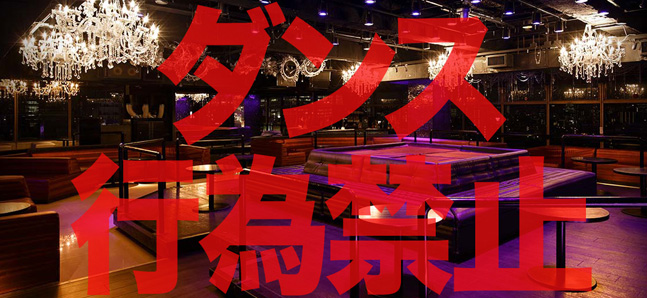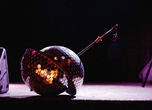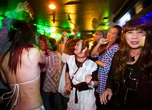Tokyo police still don’t like late-night dancing
Roppongi ‘luxury entertainment space’ Vanity raided for violating anti-dancing law

No dancing: Roppongi’s Vanity was raided for permitting unlicensed boogying
Posted: Mon May 27 2013
The police crackdown on all-night dancing in Tokyo clubs continued last weekend, as Roppongi's Vanity became the latest venue to be targeted under the so-called fueiho law. A group of police officers raided the 500-capacity club (which bills itself as a ‘luxury entertainment space’) at 2am on Sunday morning and arrested three male staff on suspicion of allowing unlicensed dancing. Suspect Ken Ohara, 31, denied the charges.
The fueiho law, which we wrote about extensively last year, governs a range of entertainment businesses in Japan, from restaurants to mahjong parlours. One of its more controversial (and misunderstood) rules is a proviso that nightclubs must have at least 66 square metres of unobstructed floor space, and that they must close by either midnight or 1am, making all-night dance parties technically illegal. Many venues have attempted to duck these restrictions by applying for licenses as food and drinks establishments instead of nightclubs, a tactic chosen by Vanity (full name: Vanity Restaurant Tokyo).
While the fueiho laws have been enforced with unflinching consistency in Osaka in the past few years (with a predictably dire effect on the city's club scene), in Tokyo they're wielded far more selectively. As discussed in our story on the subject last year, police will sometimes use the fueiho as a convenient means of targetting venues that are actually suspected of other offences, including drugs and links with organised crime.
In Vanity's case, the venue's reputation as a pick-up spot for flirtatious parties might have proved its undoing. Media reports have focussed on problems surrounding the club, including public disturbances caused by customers. According to the Sankei Shimbun (Japanese original here), half of the 110 emergency calls received by the Azabu Police Station in central Roppongi from January to April this year came between 10pm and 8am, the operating hours of the area's many nightspots. Out of those 2,149 calls, 125 related to incidents in the Roi building, the entertainment complex that houses Vanity and a variety of other late-night bars and clubs.
It's tempting to see some symbolic significance in the timing of the raid, however. The police action comes less than a week after the Let's Dance campaign submitted a 150,000-signature petition to the Diet, demanding that the law be changed. A 60-member, non-partisan group of lawmakers is now championing the cause within the Diet, presided over by LDP house of councilors representative Kenji Kosaka, a former Minister of Education, Culture, Sports, Science, and Technology. It's possible that the police really are just interested in quashing unlicensed dancing, but it might just be that they're racking up a few more hits while the going's still good.
Tweets
- About Us |
- Work for Time Out |
- Send us info |
- Advertising |
- Mobile edition |
- Terms & Conditions |
- Privacy policy |
- Contact Us
Copyright © 2014 Time Out Tokyo














2 comments Add a comment
So, where can people dance and actually enjoy themselves in a society that is so strict and not fun? Where can they go to actually take a breather from the stresses of work life, being sad, or lonely? Does the government want Japanese people to be stressed out? Not have an outlet to feel better about themselves? I think this law is ridiculous and selfish.
These types of clubs needs to be Yak Protected. All yakuza clubs stay open all times of the night doing whatever they want.
Add your comment